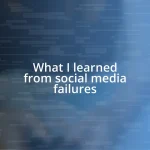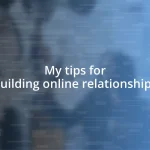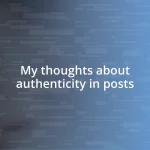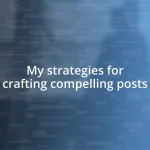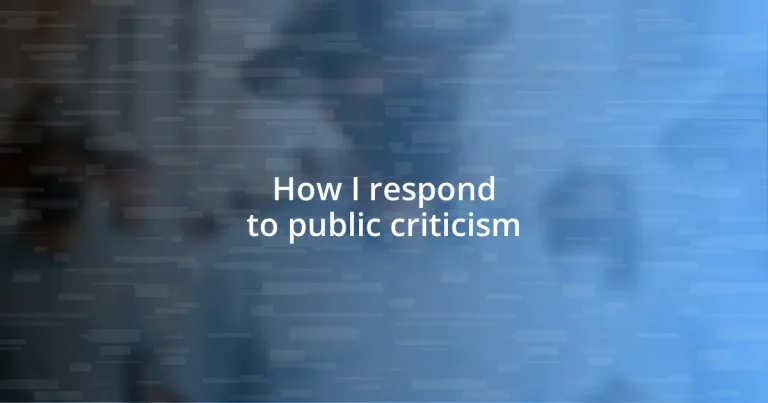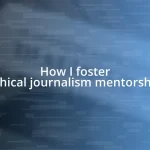Key takeaways:
- Public criticism often reflects the critic’s insecurities and can serve as a catalyst for personal growth if approached with the right mindset.
- Recognizing and managing emotional responses to criticism is vital; this self-awareness can lead to deeper insights and improved resilience.
- Developing a personal response strategy, including mental preparation and framing feedback within a broader context, enhances how one navigates criticism effectively.
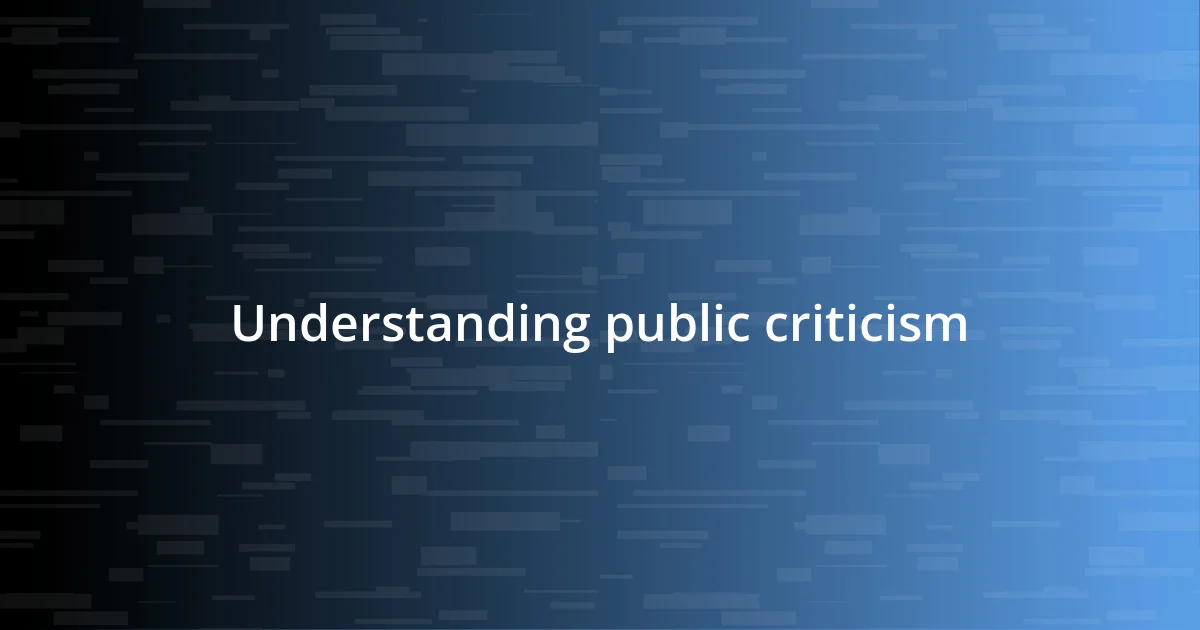
Understanding public criticism
Public criticism often feels like a spotlight shining on our vulnerabilities. I remember the first time I received a harsh comment about my work; it stung deeply. It made me question not just the feedback but my entire approach—what did I do wrong, and how could I improve?
Criticism can reveal a lot about societal expectations and personal values. Have you ever thought about how the harshest critics often reflect their own insecurities? I’ve noticed that many critiques aren’t really about me; they’re more a projection of what others struggle with themselves. It’s a tough pill to swallow, but it has helped me grow thicker skin.
Understanding public criticism also involves recognizing its potential for growth. I’ve learned to sift through the noise and find constructive elements that can propel my work forward. For instance, reading a negative review can lead to insights about audience perception, even if the delivery feels harsh. How can we use this feedback as a stepping stone rather than a stumbling block? This shift in mindset has been crucial in my journey.
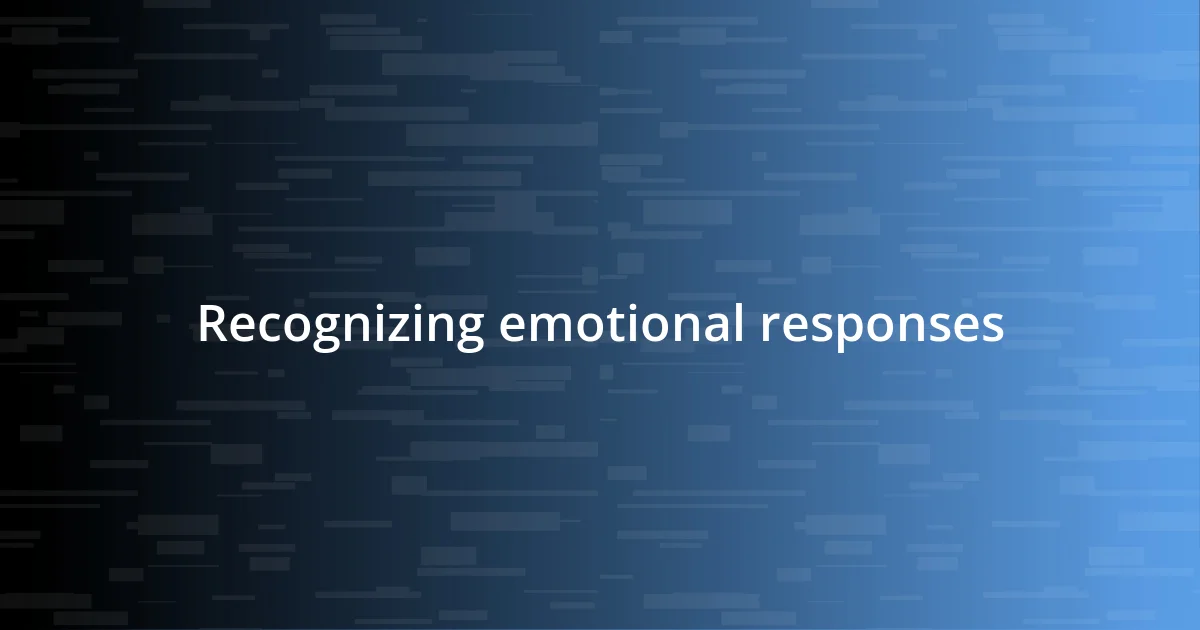
Recognizing emotional responses
Recognizing emotional responses to criticism is pivotal in navigating our reactions. I often find myself feeling defensive when someone critiques my work. This gut reaction can cloud my judgment, making it hard to discern if their feedback holds any real merit or if it’s simply an emotional outburst of my own insecurity.
At times, the rush of emotions, like anger or disappointment, can be overwhelming. A particular instance stands out to me: after receiving a particularly harsh review, I felt so disheartened that I almost walked away from my project altogether. However, taking a moment to breathe and reflect helped me realize that my emotional response was valid, yet it didn’t have to dictate my next steps. Instead, I used that intensity to fuel my desire for improvement.
It’s also interesting how our emotional responses can serve as indicators of deeper issues. When I feel an intense anxiety spike in response to criticism, it often uncovers something I need to address within myself. I’ve learned to ask myself, “Why does this bother me so much?” Identifying these triggers not only helps me manage my reactions but also fosters personal growth and resilience.
| Emotion | Response |
|---|---|
| Defensiveness | Often leads to shutting down rather than engaging with the feedback. |
| Disappointment | Can result in a temporary loss of motivation and focus on the work. |
| Anxiety | Signals deeper insecurities and prompts introspection. |
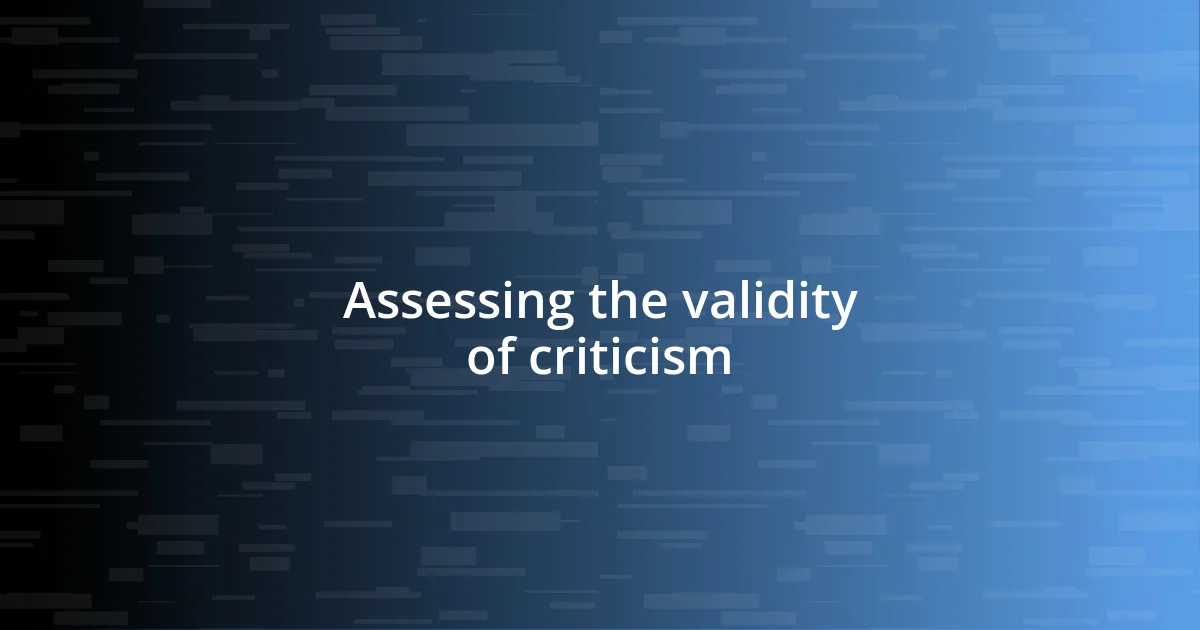
Assessing the validity of criticism
To truly assess the validity of criticism, I find it’s essential to approach it with a critical yet open mindset. When I receive feedback, I pause and ask myself a few key questions. Is the criticism specific? Does it come from a credible source? This reflective process allows me to discern between constructive advice and mere noise. I’ve learned that not all criticism is worth my attention, but when it is valid, it can serve as a roadmap for my improvement.
- Is the feedback constructive? Look for actionable suggestions rather than vague insults.
- Who is offering the criticism? Consider the background and intentions of the critic—do they have expertise in the area they are criticizing?
- What is my emotional response? Reflect on whether my reaction is clouding my ability to see the truth in the feedback, giving me the opportunity to separate my feelings from the facts.
- Can I identify recurring themes? If multiple people are pointing out the same issue, it’s worth digging deeper into that aspect.
These questions guide me to more effectively judge the validity of the feedback I’m receiving. One time, after presenting a project, I was criticized by an industry veteran. Initially, I felt defensive and irritated, thinking my work was misjudged. However, upon reflection, I recognized that their insights aligned with concerns I had been privately wrestling with for a while. Embracing their feedback ultimately enriched my understanding and led to better outcomes.
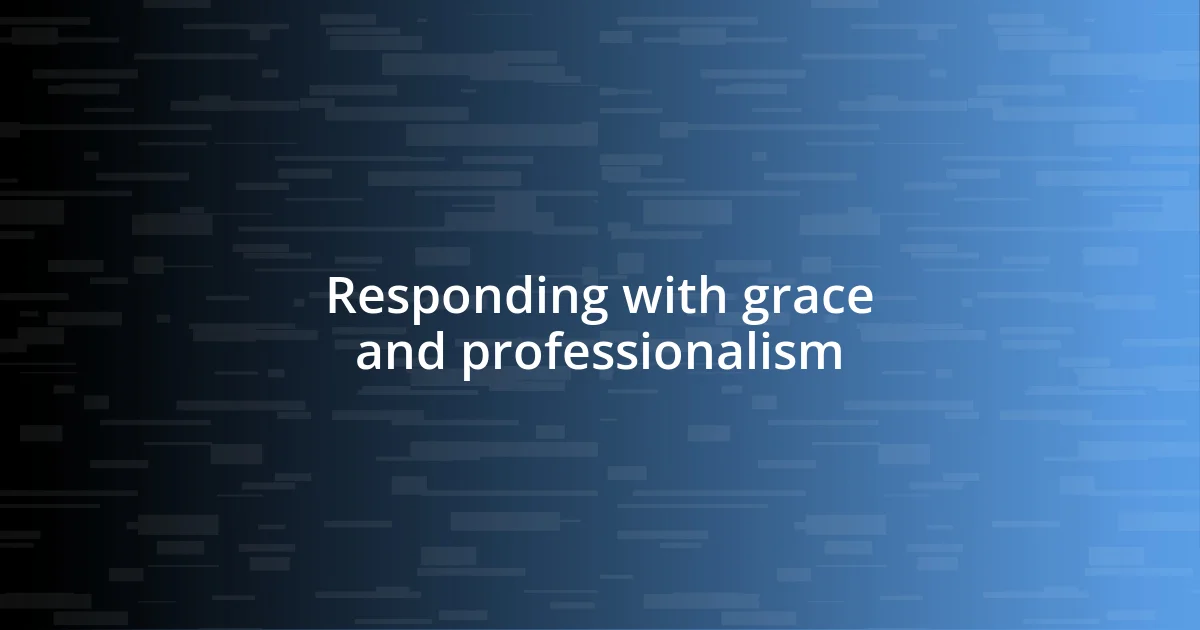
Responding with grace and professionalism
Responding to criticism with grace and professionalism can be a true test of character. I’ve found that taking a moment to pause before reacting can make all the difference. One time, after receiving criticism on a presentation, I felt a rush of indignation. Instead of lashing out, I took a step back, collected my thoughts, and replied respectfully, which surprisingly opened a constructive dialogue. Isn’t it fascinating how a calm approach can transform a potentially hostile interaction into a meaningful conversation?
In my experience, acknowledging the critic’s perspective is vital. I remember a situation where a colleague critiqued my writing style publicly during a meeting. My initial instinct was to defend my choices, but recognizing their intention to help me improve allowed me to respond positively. By thanking them and expressing my willingness to discuss their feedback further, I not only showcased professionalism but also fostered an atmosphere of collaboration. Have you ever noticed how a simple acknowledgment can disarm tension and lead to a healthier exchange of ideas?
Ultimately, maintaining professionalism means respecting both the feedback and the person delivering it. I often remind myself that criticism does not diminish my value; instead, it reflects the shared journey of growth we’re all on. Once, a trusted mentor offered me some tough love after a project went awry. I took a deep breath, accepted their insights gracefully, and incorporated their suggestions, resulting in a much stronger final product. Isn’t it remarkable how embracing constructive criticism can pave the way for genuine improvement?
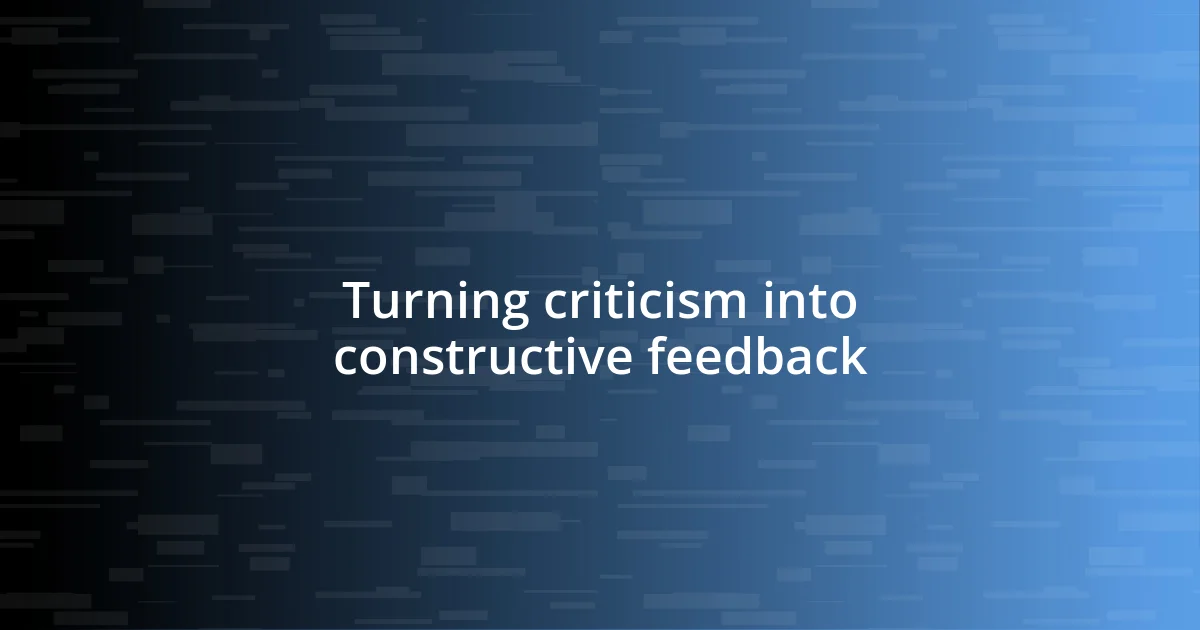
Turning criticism into constructive feedback
Turning criticism into constructive feedback involves viewing the situation through a lens of growth and opportunity. For instance, I recall an instance where a close friend critiqued my public speaking ability. At first, I felt a twinge of embarrassment, but then I realized their suggestions were rooted in genuine concern for my success. How often do we truly listen to someone who wants us to shine?
As I processed this feedback, I made a concerted effort to identify specific points they raised. They suggested I work on my pacing and engage the audience more effectively. In the following weeks, I practiced these skills relentlessly. It’s incredible how targeted feedback can help us fine-tune our approach, transforming weaknesses into strengths.
Another time, during a team meeting, my boss pointed out that my reports lacked clarity. While I felt a pang of frustration, I chose to dig into their comments. This resulted in a much clearer reporting style that not only satisfied my boss but also enhanced team efficiency. Have you ever experienced that breakthrough moment when you realize criticism is just a stepping stone to improvement?
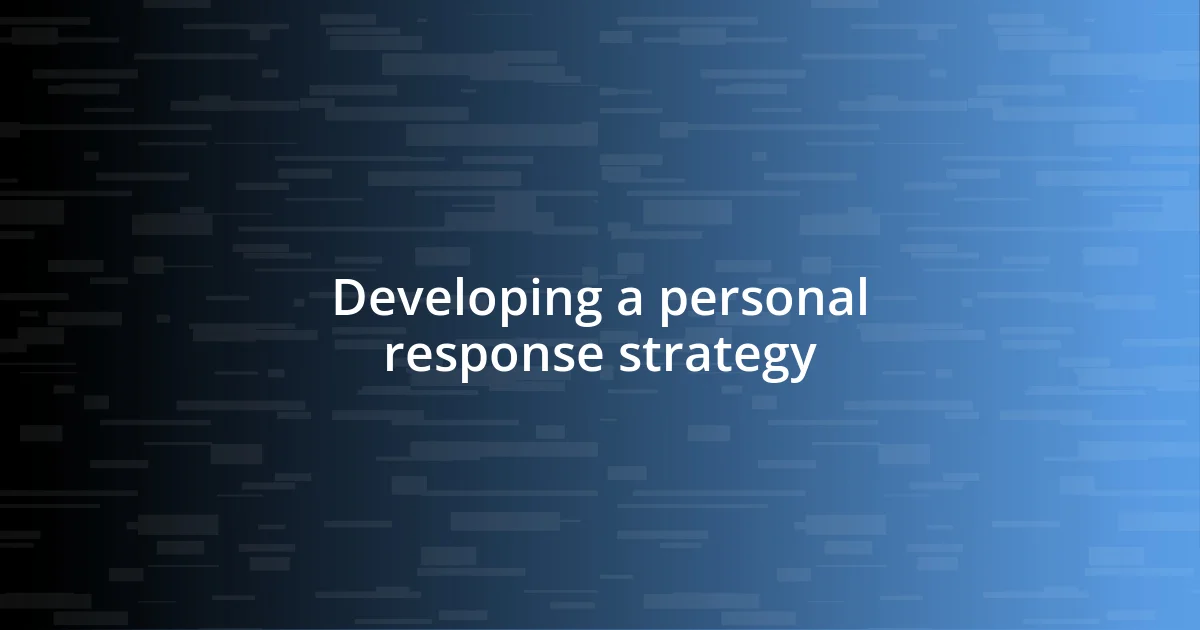
Developing a personal response strategy
Developing a personal response strategy is crucial to navigating criticism effectively. I remember attending a workshop on handling feedback, and one key takeaway that resonated with me was to have a mental checklist prepared. This checklist included reminders to breathe deeply, assess the validity of the criticism, and formulate a thoughtful response rather than an impulsive reaction. Have you ever felt the pressure of defending yourself in the heat of the moment? Trust me, taking a beat to reflect can drastically change the way we communicate.
I find it helpful to practice role-playing scenarios with a friend or mentor, which allows me to process potential criticisms in a safe space. For example, I rehearsed responses to mock critiques on a presentation I was passionate about. This practice not only built my confidence but also helped me identify key points I wanted to address, making it easier to stay composed when real feedback came around. How often do we seize the opportunity to prepare ourselves mentally before facing a challenging conversation?
Finally, I’ve discovered that framing criticism within a broader context can shift my perspective significantly. For instance, when I received an unexpected piece of negative feedback on a project I poured my heart into, I chose to consider it as an element of my ongoing journey rather than a personal attack. I visualized my growth trajectory, recognizing that each critique is a stepping stone to a more refined version of myself. Isn’t it empowering to think that criticism can lead to better outcomes if we reshape our perception of it?
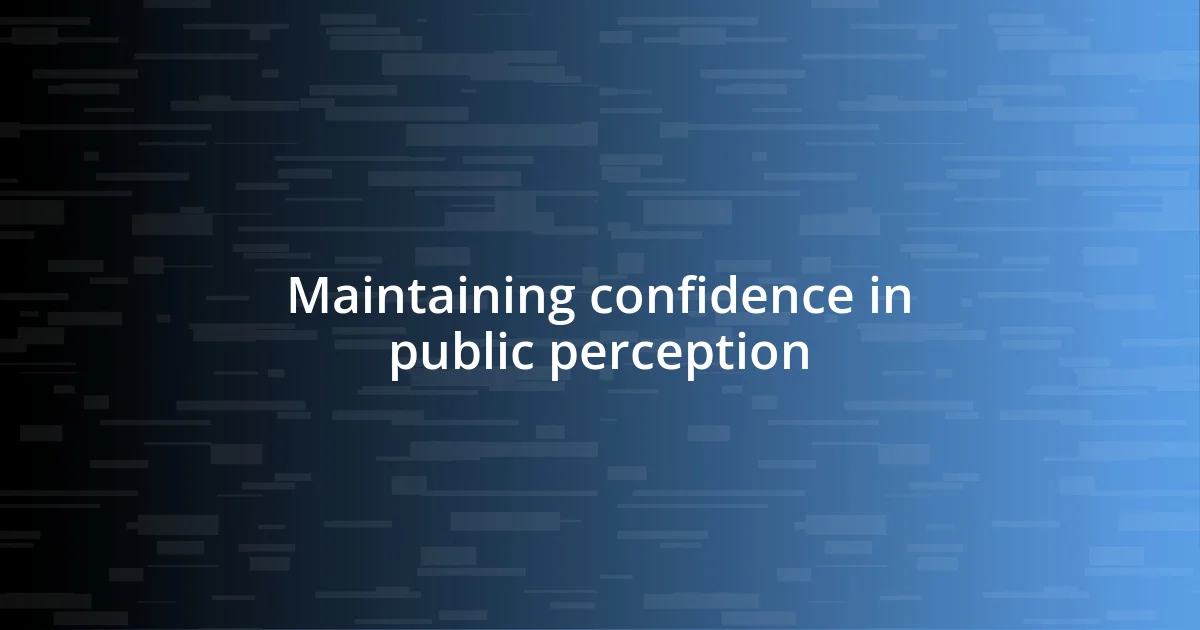
Maintaining confidence in public perception
Maintaining confidence in public perception can be a challenge, but I’ve learned that self-assurance is rooted in understanding who I am and what I stand for. For example, after receiving a critical comment about my writing style on a public platform, I paused and reflected on my journey as a writer. Instead of letting that comment define me, I embraced it as part of my evolution. The question is, how often do we allow others’ viewpoints to shake our self-image?
I also find that surrounding myself with supportive individuals boosts my confidence. Recently, after a presentation that attracted mixed feedback, I reached out to trusted colleagues who provided honest yet uplifting insights. Their encouragement reminded me of my strengths and reinforced my belief in my abilities. Do you have a circle of people who celebrate your wins and encourage you through your challenges?
Moreover, embracing a growth mindset has transformed my approach to public scrutiny. When I initiated a community project that faced skepticism, I chose to focus on the impact I aimed to create rather than dwelling on doubt. Even when faced with criticism, I maintained my passion and commitment, reminding myself that every innovator has faced detractors. I often ask myself, what is more important: the noise from critics or the positive change I’m striving to achieve? By continually affirming my purpose, I’ve found it easier to maintain confidence despite public perception.




